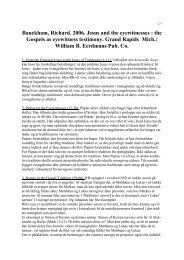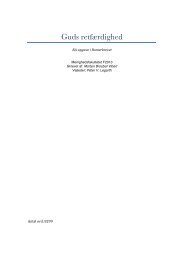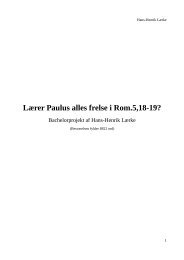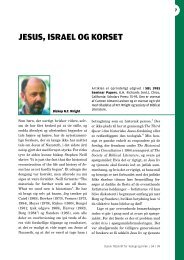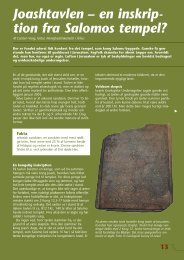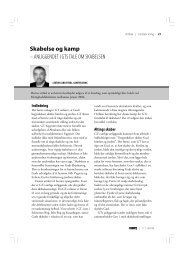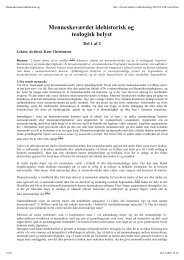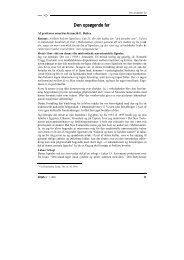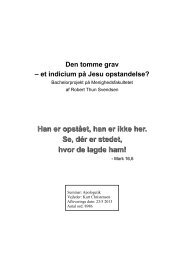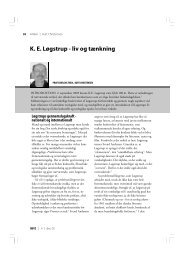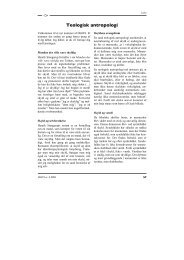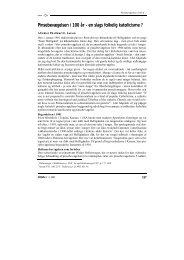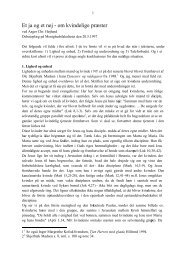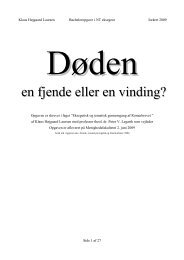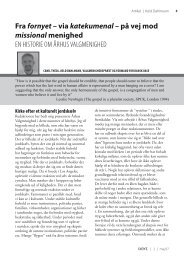Indholdsfortegnelse
Indholdsfortegnelse
Indholdsfortegnelse
You also want an ePaper? Increase the reach of your titles
YUMPU automatically turns print PDFs into web optimized ePapers that Google loves.
190 Sammenfatning og konklusion<br />
the narrative as the answer to the aporie between experienced and cosmic time viewing it as<br />
the creator of a "historical" time.<br />
The surplus of meaning in the text necessitates interpretation. Ricoeur evolves his interpretation<br />
theory firstly through a confrontation of opposite viewpoints in hermeneutics versus<br />
critique of ideology and structuralism and secondly against the background of the distance<br />
implicated in text as written discourse and the idea of a world of the text projected by the text<br />
as work or narrative. The theory includes both critique and appropriation in one hermeneutical<br />
movement corresponding to the dialectic of life between belonging and alienation. It is a<br />
movement from naive understanding via explanation to a substantiated understanding, a post<br />
critical appropriation, which is the telos of interpretation, in which the reader makes the<br />
meaning of the text her/his own and thereby understands her-/himself better.<br />
Working with specifically religious language Ricoeur approaches the subject as a philosopher<br />
seeking to identify a religious belief through its language, which as proclamation stays<br />
in a tensional relationship to a phenomenology of the sign of the holy, its manifestation. Ricoeur<br />
recognises a re-establishing of the holy - as a manifestation in the life of the believer -<br />
in the Word delivered as witness fixed in writing. The subject of the Biblical texts, the world<br />
they unfold, is the Kingdom of God, and these texts which "create what they name", and this<br />
power forms their character of revelation. The Biblical texts include a wide range of discourse<br />
forms. The purpose of the religious texts is giving rise to faith, and this faith is an appropriation<br />
of and trust in what the text says and a new life in the world created by the text.<br />
Some concluding critical remarks are raised concerning Ricoeur’s project: Does the focusing<br />
on the subject’s appropriation entail a disadvantageous anthropocentrism? Does the concrete,<br />
physical life disappear in Ricoeur’s "world of the text" made up by meaning and possibility?<br />
Is the elimination of the author intention valid? In spite of these objections it is concluded,<br />
that Ricour’s text-theory and philosophy form a suitable starting point for the discussion<br />
of text and interpretation in a theological context.<br />
Ch. 2 Hans W. Frei and the Realistic Narrative. The chapter is an account of the considerations<br />
concerning text-theory, narrative and theory of science made by the American<br />
theologian, Hans W. Frei, who is greatly influenced by the literary movement The New Criticism.<br />
Frei further belongs to the postliberal Yale School both as a person who has inspired<br />
others and as being influenced himself by among other things G. Lindbeck’s thinking concerning<br />
a "cultural-linguistic" approach as method for a theology closer to sociology than to<br />
philosophy.<br />
Frei’s book The Eclipse of Biblical Narrative is examined and an illumination of Frei’s assessment<br />
of a great number of hermeneutical and theological groupings and individuals is<br />
made, in order to elucidate Frei’s insistence on the "realistic narrative", which contains its<br />
meaning in itself. Frei has through this work made topical the nature of text meaning as field



